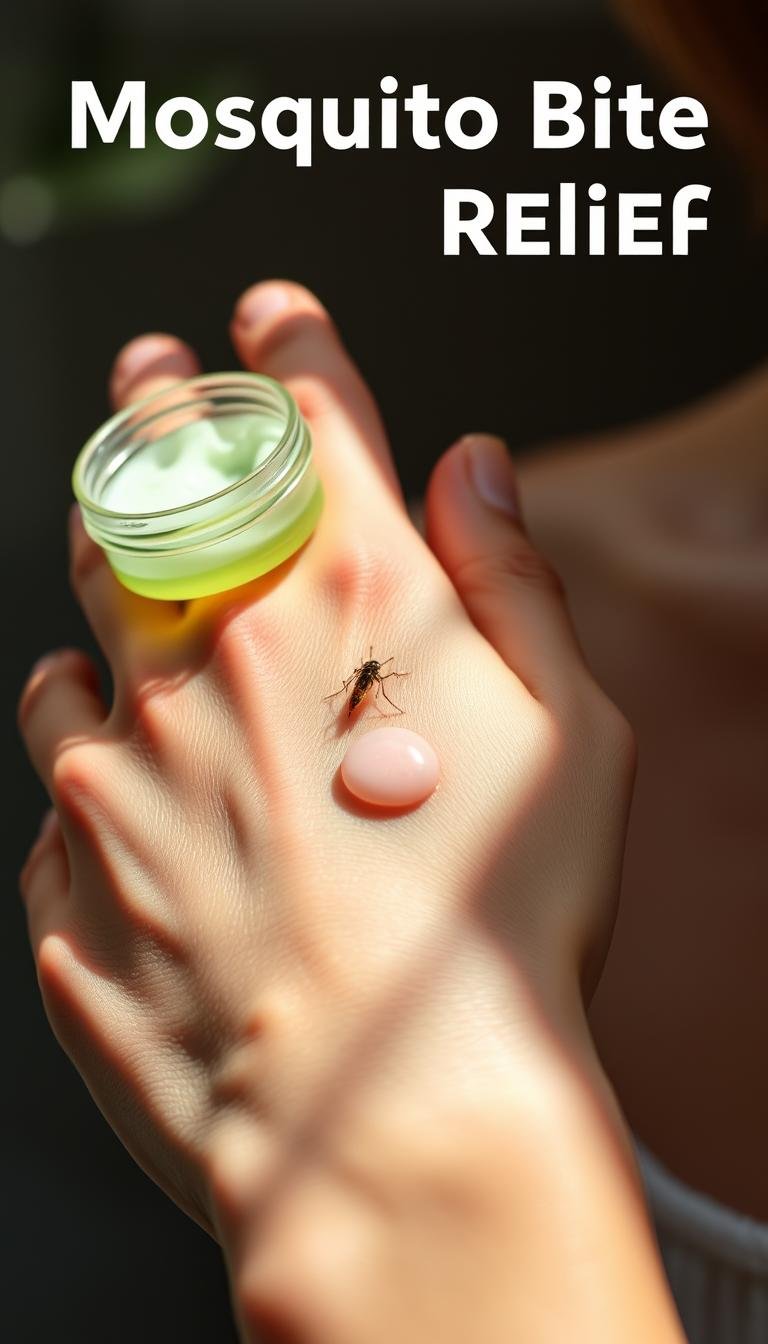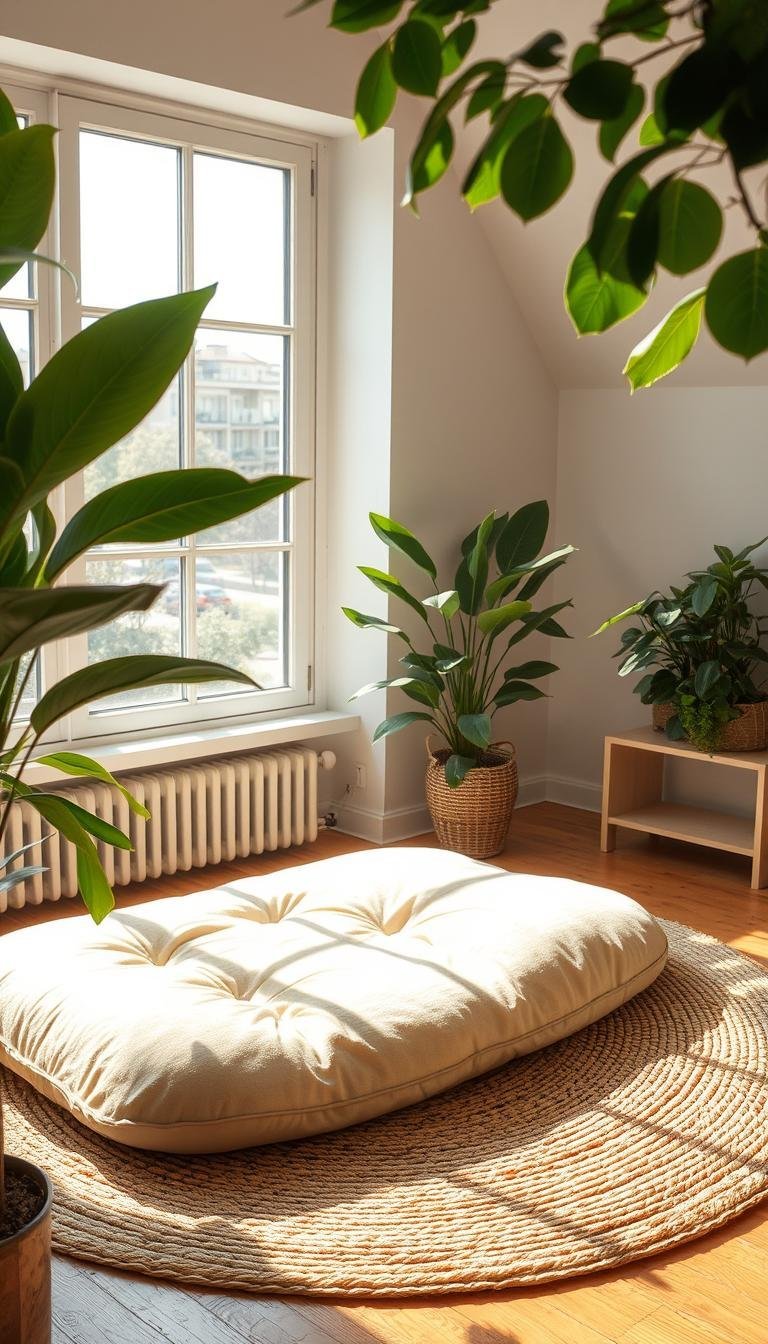(Hey! Some links in this post may be affiliate links — meaning I may earn a small commission if you buy through them, at no extra cost to you. As an Amazon Associate, I earn from qualifying purchases. I only share products I genuinely love and think you’ll find useful too. Read the full disclosure here).
Dealing with mosquito bites can be really annoying. Those itchy, red bumps can ruin your day and make you feel awful. It’s important to find ways to ease the itch and stop it from getting worse.
Finding itch relief might seem hard, but there are many solutions. In this article, we’ll look at different tips and remedies for mosquito bites. By the time you finish reading, you’ll know how to make those bites less bothersome and enjoy the outdoors again.
Contents
- 1 Why Mosquito Bites Itch and Swell
- 2 Immediate Relief Techniques for Fresh Bites
- 3 Kitchen Cabinet Mosquito Bite Remedies
- 4 Essential Oils That Soothe Mosquito Bites
- 5 Most Effective Mosquito Bite Remedy Products
- 6 Plant-Based Relief for Mosquito Bites
- 7 Preventing Future Mosquito Bites
- 7.1 CDC-Recommended Repellents
- 7.2 Thermacell Mosquito Repellent Refills; Provide 120 Hours of Prote…
- 7.3 Natural Mosquito Repellent Wipes, DEET Free Insect & Bug Repellen…
- 7.4 OFF! Deep Woods Sportsmen Insect Repellent Aerosol, Bug Spray Con…
- 7.5 Protective Clothing Strategies
- 7.6 Yard and Home Mosquito Control
- 7.7 2 Citronella Grass, Live Plants (Cymbopogon Nardus) – Natural Mos…
- 7.8 Outsidepride Lemon Grass Seeds for Planting – 1000 Perennial Seed…
- 7.9 English Lavender Seeds (600+ Heirloom Seeds – Vera True Lavender)…
- 8 When to Call a Doctor About Mosquito Bites
- 9 Special Mosquito Bite Treatments for Children
- 10 Treating Mosquito Bites for Sensitive Skin
- 11 Mosquito Bite Myths Debunked by Science
- 12 Conclusion
Why Mosquito Bites Itch and Swell
When a mosquito bites, it causes a reaction in your body. This reaction can lead to itchiness and swelling. Let’s explore why this happens by looking at the biology of mosquito bites and how your body reacts to the saliva injected during the bite.
The Biology Behind Mosquito Bites
Mosquitoes bite to feed on blood, which is key for their reproduction. When a mosquito bites, it uses its proboscis to pierce the skin. It then injects saliva that contains anticoagulants to prevent the blood from clotting. This saliva is foreign to your body and triggers an immune response.
How Your Body Reacts to Mosquito Saliva
Your immune system sees the mosquito saliva as an invader. It responds by releasing histamine, a chemical involved in allergic reactions. The release of histamine causes blood vessels to dilate, leading to increased blood flow to the affected area. This results in swelling. It also stimulates nerve endings, causing itchiness.
Common Symptoms to Expect
The symptoms of a mosquito bite can vary. Common reactions include redness, swelling, and itchiness around the bite area. In some cases, people may experience more severe reactions, such as blistering or a larger area of swelling. Understanding these symptoms can help you manage your reaction and find relief.
By understanding why mosquito bites react the way they do, you can better manage your symptoms. Whether it’s reducing itchiness or minimizing swelling, knowing what’s happening in your body is the first step towards feeling better.
Immediate Relief Techniques for Fresh Bites
Fresh mosquito bites can be quite bothersome, but there are several techniques to provide instant relief. When you get bitten, your body’s reaction to the mosquito’s saliva causes the itching and swelling. Fortunately, you can alleviate these symptoms with some simple and effective methods.
Ice and Cold Compress Methods
One of the quickest ways to reduce swelling and itching is by applying ice or a cold compress. Cold temperatures help constrict blood vessels, which in turn reduces the flow of histamine to the affected area, minimizing itching and swelling.
How Long to Apply Cold Therapy
For optimal results, apply the cold compress for about 10 to 15 minutes. You can repeat this process several times a day as needed. Make sure to wrap the ice pack in a cloth to avoid direct contact with your skin, which can cause ice burn.
Making an Effective Cold Compress
To make a cold compress, you can either use an ice pack or a cold, damp cloth. If you don’t have an ice pack, you can wet a cloth with cold water, wring it out, and apply it to the bite. For added relief, you can even use a bag of frozen peas wrapped in a cloth.
Gentle Cleansing Protocols
Gently cleansing the affected area is also important. Use mild soap and lukewarm water to clean the bite. This helps remove any bacteria or irritants that might be present on the skin, reducing the risk of infection.
Anti-Scratch Strategies That Work
Resisting the urge to scratch is vital to prevent further irritation and possible infection. You can apply an anti-itch cream or calamine lotion to help control the itching. Keeping your nails short and wearing loose clothing can also minimize irritation.
By applying these immediate relief techniques, you can significantly reduce the discomfort caused by fresh mosquito bites. Remember, if the symptoms persist or worsen, it’s always a good idea to consult with a healthcare professional.
Kitchen Cabinet Mosquito Bite Remedies
When mosquito bites happen, relief might be in your kitchen. Many common items can soothe the itch and reduce swelling.
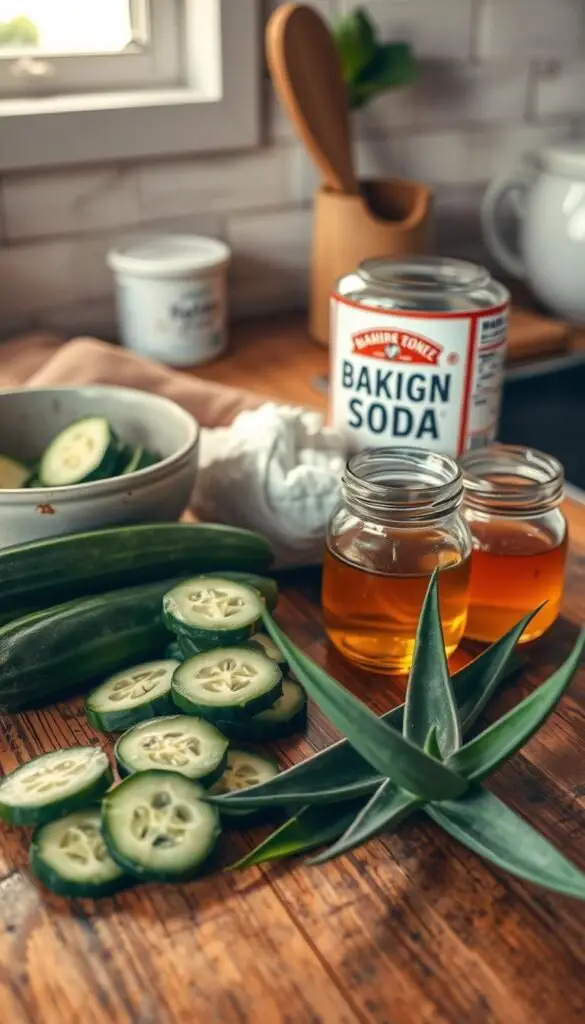
Baking Soda Paste Applications
Baking soda is a kitchen must-have. It can make a paste to neutralize mosquito bite acid. Mix 1 tablespoon of baking soda with 1 tablespoon of water. Apply it for 10-15 minutes, then rinse with warm water. This can lessen itching and swelling.
Apple Cider Vinegar Treatments
Apple cider vinegar has anti-inflammatory properties. Apply it directly to the bite with a cotton ball. Or mix it with water for a cool compress. Its acidity reduces itching and aids healing.
Honey as a Natural Anti-Inflammatory
Honey is antibacterial and anti-inflammatory. Apply a thin layer to the bite and cover with a bandage. Leave it on for a few hours or overnight. It helps reduce swelling and itching.
Salt and Water Solutions
A saltwater solution can also help. Mix 1 teaspoon of salt with 1 cup of warm water. Soak a cloth, wring it out, and apply it as a cool compress. This reduces itching and promotes healing.
These kitchen remedies offer a natural way to combat mosquito bites. By using items you likely have at home, you can skip over-the-counter creams and lotions.
💬 Tried & True Tip:
“I always keep a tiny jar of baking soda paste in the fridge during summer. It sounds simple, but it’s been the best quick fix for itchy bites after gardening. It cools instantly and works better than most creams I’ve tried.”
Essential Oils That Soothe Mosquito Bites
Essential oils are a natural way to ease mosquito bite discomfort. They come from plants and have healing properties. Used right, they can quickly ease itching and swelling.
Tea Tree Oil Application Methods
Tea tree oil is great for mosquito bites because it fights infection and reduces swelling. Mix a few drops with coconut or olive oil. Then, use a cotton swab to apply it to the bite. This can help stop itching and prevent infection.
Lavender Oil for Itch Relief
Lavender oil is known for calming and can help with mosquito bite itch. Apply it directly to the bite, but mix it with a carrier oil first to avoid skin irritation. Lavender oil’s soothing effects can help you relax and stop scratching.
Peppermint Oil Cooling Effects
Peppermint oil cools the skin, which can ease itching and swelling from mosquito bites. Mix it with a carrier oil and apply it to the affected area. The cool feeling can give you quick relief and comfort.
Proper Dilution Guidelines for Safety
Always dilute essential oils with a carrier oil before skin use, as they are strong. Use 1-3% essential oil in a carrier oil. For example, mix 5-7 drops of essential oil with 1 teaspoon of carrier oil. Always test a small area first to avoid any bad reactions.
Using these essential oils can help you naturally find relief from mosquito bites.
Most Effective Mosquito Bite Remedy Products
Finding relief from mosquito bites is easier with the right products. The US market has many effective solutions. They help with itchiness and swelling.
Top-Rated Antihistamine Creams
Antihistamine creams are a favorite for mosquito bite relief. They reduce the allergic reaction to the bite. This lessens itchiness and swelling.
Some top choices include:
- Benadryl Itch Stopping Cream
- Neosporin Itch Relief Cream
You can find these creams at most pharmacies and online.
Hydrocortisone Products Worth Trying
Hydrocortisone creams and ointments are also effective. They reduce inflammation and itching. This is because they suppress the immune system’s reaction to the bite.
Recommended hydrocortisone products include:
- Cortizone-10 Cream
- Hydrocortisone Acetate 1% Cream
Calamine Lotion Application Tips
Calamine lotion is a classic remedy for mosquito bites. It provides cooling relief and reduces itchiness. Here’s how to use it effectively:
How Much to Apply
Apply a thin layer of calamine lotion to the affected area. You can reapply as needed. But avoid overusing it to prevent dry skin.
When to Reapply
Reapply calamine lotion every few hours or as needed. If the itching persists, you might need to use it with other treatments.
By using these products, you can enjoy the outdoors without itchy bites.
Plant-Based Relief for Mosquito Bites
Nature has many plant-based solutions for mosquito bites. These natural remedies are effective and gentle on the skin.
Aloe Vera Gel Treatments
Aloe vera is famous for soothing skin. Applying aloe vera gel to mosquito bites can lessen inflammation and itching. You can use aloe vera from the plant or buy a gel.
Fresh Basil Leaf Applications
Fresh basil leaves can be crushed and applied to mosquito bites. Basil’s anti-inflammatory properties help soothe the skin and reduce itching.
Plantain Leaf Poultices
Plantain leaves have been used for centuries to treat skin irritations, including mosquito bites. Making a poultice from the leaves can be applied directly to the affected area for relief.
Witch Hazel Astringent Benefits
Witch hazel is an astringent that reduces swelling and itching from mosquito bites. Dabbing witch hazel on the affected area can provide quick relief and promote healing.
These plant-based remedies are a natural and effective way to manage mosquito bite discomfort. By using these treatments, you can enjoy the outdoors without itchy bites.
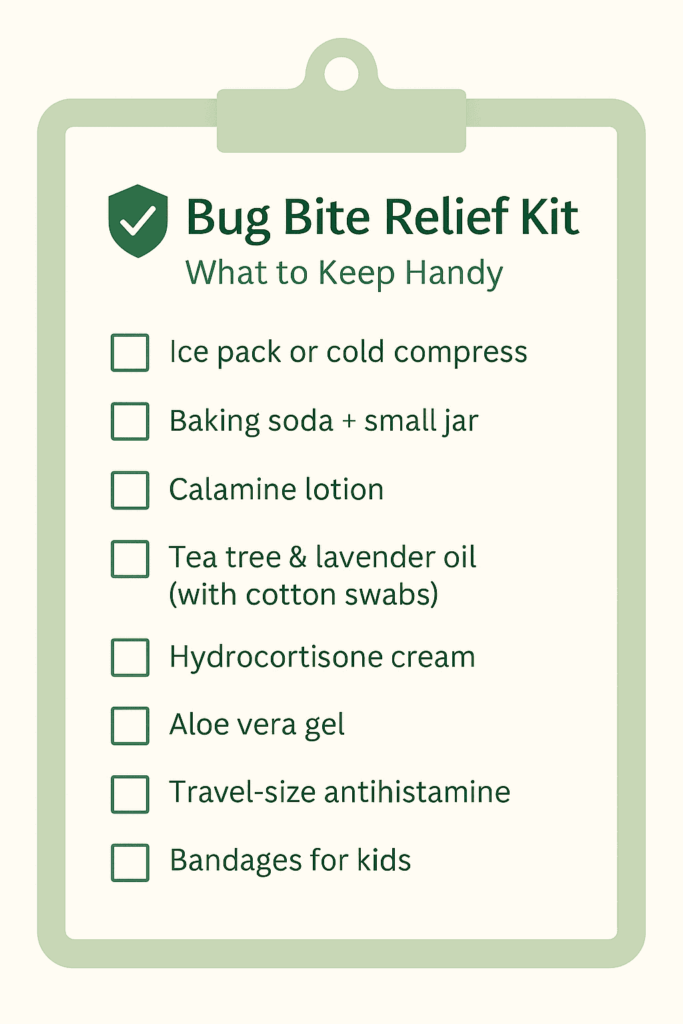
Preventing Future Mosquito Bites
The best way to deal with mosquito bites is to prevent them from happening in the first place. By taking a few simple precautions, you can significantly reduce your chances of getting bitten.
CDC-Recommended Repellents
The Centers for Disease Control and Prevention (CDC) recommend using EPA-registered insect repellents. These include:
- DEET-based repellents
- Picaridin-based repellents
- Oil of lemon eucalyptus (OLE) or para-menthane-diol (PMD) based repellents
- IR3535-based repellents
Always follow the product instructions for safe and effective use.
Protective Clothing Strategies
Wearing protective clothing can provide a barrier against mosquito bites. Consider:
- Wearing long-sleeves and long pants
- Using clothing treated with permethrin
- Tucking pant legs into socks to prevent mosquitoes from reaching your skin
Yard and Home Mosquito Control
Controlling mosquitoes around your home is key. This includes:
Eliminating Standing Water
Mosquitoes need standing water to breed. Regularly check your yard for:
- Flowerpots
- Clogged drains
- Pet water dishes
- Any other containers that can hold water
Empty or clean these areas regularly.
Mosquito-Repelling Plants
Some plants are known to repel mosquitoes. Consider planting:
- Citronella
- Lavender
- Basil
- Rosemary
These plants can be a natural addition to your mosquito prevention strategy.

By implementing these strategies, you can enjoy the outdoors with fewer worries about mosquito bites.
When to Call a Doctor About Mosquito Bites
Not all mosquito bites are the same. Some can cause serious reactions or diseases that need quick attention. It’s key to know when to seek medical help.
Signs of Severe Allergic Reactions
Some people have severe allergic reactions to mosquito bites. These can show up as:
- Swelling of the face, lips, or tongue
- Difficulty breathing
- Rapid heartbeat
- Dizziness or fainting
Symptoms of West Nile and Other US Mosquito-Borne Diseases
Mosquitoes can spread serious diseases like West Nile virus, Zika virus, and dengue fever. Look out for symptoms like:
- Fever
- Headache
- Body aches
- Skin rash
Medical Treatment Options
If you’re showing severe symptoms or think you have a mosquito-borne illness, get medical help. Treatment might include:
- Antihistamines for allergic reactions
- Antiviral medications for certain viral infections
- Supportive care, such as rest and hydration, for symptom management
Special Mosquito Bite Treatments for Children
Mosquito bites can really bother kids, needing special care. Their skin is more sensitive, so they need gentle treatments. You want to make sure your child feels better and doesn’t scratch too much.
Age-Appropriate Remedies for Kids
For little ones, it’s important to use safe and effective remedies. Calamine lotion and hydrocortisone cream are good options, but check with your pediatrician first. They might suggest oatmeal baths to calm itchy skin.
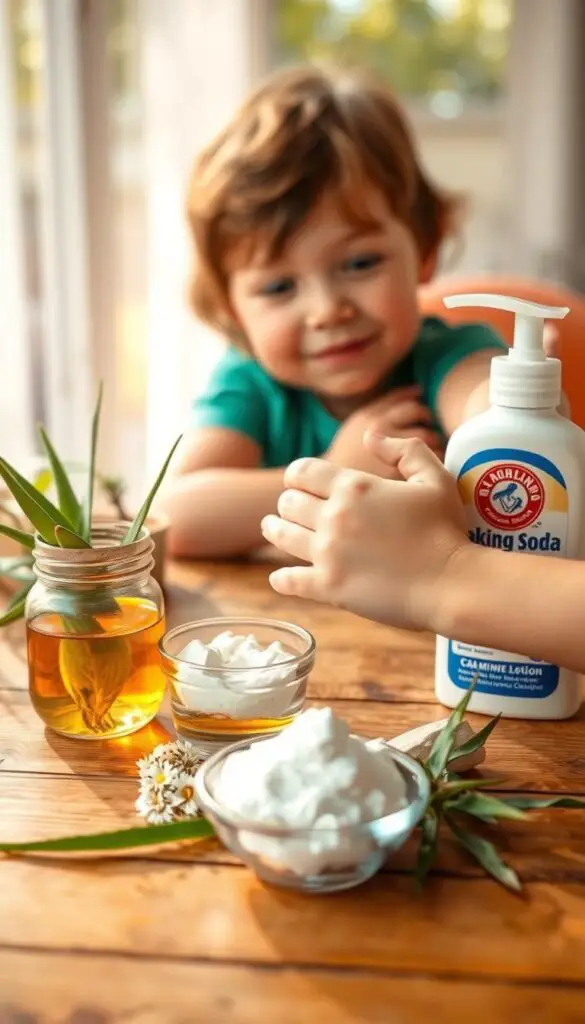
Pediatrician-Approved Products
Choose products that are pediatrician-approved for your child. Look for ones with anti-itch ingredients like diphenhydramine. But, always follow the instructions carefully.
Helping Children Avoid Scratching
It’s key to teach kids not to scratch to avoid infections. Keep their nails short. Use mittens or bandages on their hands, mainly at night. Distract them with fun activities or a cold compress can also help.
When to Seek Medical Care for Children’s Bites
If your child has a bad reaction, like trouble breathing or swelling, get help right away. Also, watch for signs of infection like more redness or pus. “If you’re ever unsure about your child’s reaction, always talk to your pediatrician,” advises Dr. Jane Smith, a seasoned pediatrician.
By following these tips, you can make your child more comfortable and lower the chance of problems from mosquito bites.
Treating Mosquito Bites for Sensitive Skin
For those with sensitive skin, finding the right treatment for mosquito bites is key. You need something that’s gentle. We’ll look at some options that fit your needs.
Hypoallergenic Treatment Options
Using hypoallergenic products is a good start. They’re made to reduce allergic reactions. These products are usually fragrance-free and soft on your skin.
Pregnancy-Safe Remedies
If you’re pregnant, picking safe remedies is vital. Oatmeal baths and cold compresses are often suggested.
Solutions for Eczema-Prone Skin
For eczema-prone skin, avoiding irritants is key. Use products that calm your skin. Aloe vera and hydrocortisone creams can help.
Choosing the right treatments can ease mosquito bite discomfort without irritating your skin. Always talk to a healthcare professional to find the best options for you.
Mosquito Bite Myths Debunked by Science
The itch from a mosquito bite is bad enough, but what if the cure is worse than the bite itself? Many home remedies have been passed down through the years, but not all of them are backed by science. Let’s take a closer look at some common myths surrounding mosquito bite treatments.
Why Toothpaste Doesn’t Work
You may have heard that applying toothpaste to a mosquito bite can help alleviate the itch. But, this remedy is more myth than magic. Toothpaste isn’t made to treat insect bites, and its ingredients can sometimes irritate the skin further.
The Truth About Banana Peels
Some people swear by rubbing banana peels on mosquito bites to reduce itching. While banana peels are generally harmless, there’s little scientific evidence to support their effectiveness in treating mosquito bites.
Harmful Folk Remedies to Avoid
Certain folk remedies can do more harm than good. For instance, applying mud or dirt to a mosquito bite can lead to infection. It’s important to avoid using unproven remedies that can compromise skin health.
What Research Actually Supports
So, what does work? Research supports the use of proven treatments like hydrocortisone cream and antihistamines to alleviate itching and reduce swelling. Always opt for treatments backed by scientific evidence to ensure you’re giving your skin the best care.
- Use hydrocortisone cream to reduce inflammation.
- Apply antihistamines to alleviate itching.
- Avoid unproven folk remedies that can cause more harm.
Conclusion
Now that you know how to relieve mosquito bites, it’s time to use this knowledge. Understanding how to manage bites can help you feel better and avoid problems. Natural remedies like aloe vera, tea tree oil, and honey offer mosquito bite relief without chemicals.
Preventing bites is also important. Use CDC-recommended repellents, wear protective clothes, and control mosquitoes in your yard. This way, you can avoid getting bitten. Being aware and taking precautions is part of a bigger prevention plan.
By using relief methods, natural remedies, and prevention, you can enjoy the outdoors more. Stay informed, be ready, and take charge of your outdoor time.
“Summer should be about fun, not frustration. These little tricks have saved me more times than I can count—and I hope they help you too.”

